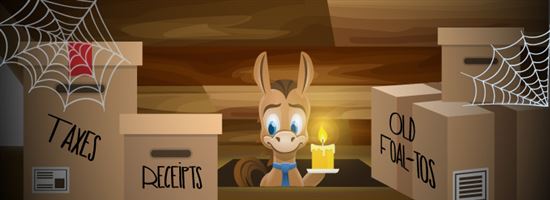How Long Does Underwriting Take?
Underwriters have your financing in their hands. They can decide "yes" or "no". Learn how the mortgage underwriting process works and how to speed it up.
 |
| © CreditDonkey |
Many people feel that the mortgage process takes too long. It may feel that way as you anxiously wait for an answer. But, on average, you can expect to be at a closing table within 45 days of applying.
Of course, this varies by lender and even by borrower--yes, you play a role in the speed at which your loan closes.
So why does the process take so long? Keep reading to find out.
What Does an Underwriter Do?
 |
The underwriter's job is to determine the bank's level of risk if they give you a loan. Underwriters look at the 3 C's of Underwriting. These include:
Credit: Your credit history and/or credit score show the lender your level of financial responsibility. Consider:
- Do you pay your bills late?
- Do you have any foreclosures or bankruptcies in your credit history?
- Is most of your credit new?
- Do you overextend yourself by using up all of your available credit?
Capacity: This measures your ability to repay the loan. Lenders look at:
- Your debt ratio (your debts compared to your income)
- The number of borrowers on the loan
- The amount of cash you have on hand after making the down payment.
Underwriters also consider the loan's term. If you take out a 30-year mortgage, can you feasibly make those payments for the next 30 years?
Collateral: This determines the value of the home itself. It needs to be worth at least as much as the purchase price.
Underwriters also look at the type of home (single-family, condo, multi-unit) and how you will use it. For example, is this your owner-occupied home or is it an investment?
What You'll Need
 |
| © CreditDonkey |
The underwriter determines how you fit into the 3 C's by collecting proof of your:
- Income
- Assets
- Debts
- Credit history
The process may take a few days or a few weeks. It all depends on the complexity of the documents you provide, the thoroughness of the documents you provide, and your level of communication with the underwriter.
The more efficient and organized you are, the quicker the process can proceed.
What Is Initial Underwriting Approval?
As you move through the underwriting process, you'll receive several types of approval.
1. Initial underwriting approval: You may also hear it called conditional underwriting approval. This is the point that the underwriter has cleared the conditions that you provided documents for, such as proof of income or assets.
In other words, the underwriter has determined that you are a good candidate for a loan, which is why it's a conditional approval. You are well on your way to securing the final approval.
But you may have to satisfy more conditions down the road, including the appraisal of the property.
Whether you get a final approval on your loan or not, you will pay the appraiser for his report. This could run you anywhere from $300 to $500.
2. Final Approval: Once the underwriter approves the appraisal and/or any remaining conditions they had for the loan, the underwriter will issue the "final approval," or the "clear to close." This means you are free to close on the loan and take possession of the home.
The underwriting that is necessary to clear up a conditional approval usually only takes a matter of a few days. It depends on the lender's workload, however.
How Long Does Underwriting Take for a Home Purchase?
Buying a home is the most common reason borrowers look for a loan.
Homebuyers go through the process as discussed above with the same general timeline. However, careful attention will be paid to your assets.
Whether you make a large down payment or you are paying for your closing costs upfront, lenders need to verify that the money you use belongs to you.
That might sound strange. If it's in your bank account, shouldn't it belong to you? It might not, though. Lenders need ample proof that the money is yours.
This could increase the time it takes to underwrite your purchase loan. Keeping a paper trail of all deposits over $100 will help you decrease the time you have to wait for the underwriter to clear your loan.
How Long Does Underwriting Take for a Refinance?
Refinancing a mortgage takes an average of 30 days. Depending on your chosen lender and your situation, though, the time can vary.
For example, if you stick with your current lender, the process may be a little more streamlined. The lender already knows your personal details. They will just need to update your income, assets, and credit information to underwrite your new loan.
If you use a new lender, the process may take a little longer, since they are starting from scratch with you.
How Long Does Underwriting Take for an FHA, USDA, or VA Loan?
You may have heard that government loans take longer in underwriting. Many people believe that a government department, whether FHA, USDA, or VA, does the underwriting.
Bu this isn't the case for FHA or VA loans. It's the same underwriting process as any other loan - the lender does the underwriting. This means the same underwriting timelines often apply to government-backed loans.
The exception to the rule, however, is USDA loans. The USDA doesn't do the primary underwriting of the loan, but they do have the final say in approval. After the lender underwrites your loan, the USDA goes over the file to give their final approval.
This could add 2 to 3 weeks to the turnaround time for USDA loans.
Ways You Can Help Speed Up the Underwriting Process
You also play a role in the time it takes to underwrite your loan. Without the proper documents from you, underwriters can't review your application.
Whenever you leave incomplete spaces on the loan application or you don't provide all of the documents the underwriter needs, it slows the process down.
The quicker this communication goes, the quicker you can get the required information to the underwriter.
You can also help by providing the loan officer/underwriter with a complete package. This includes:
- Proof of the last two years of income (paystubs, W-2s, and tax returns)
- Proof of your housing history over the last two years (rent or mortgage)
- Proof of your assets
You may also want to include a written letter explaining any "odd" circumstances in your loan file.
For example, if you had a gap in your employment, you should explain the reasons in a letter. If you have proof to back up the reasons, this may help move your file along even faster.
Bottom Line
So how long can you expect to wait for underwriting? It could be anywhere from two weeks to two months.
There are a variety of factors that play a role. If turnaround time is important to you, ask the lenders that you apply with about their average turnaround time.
This will give you something else to consider as you decide which lender is right for you.
Write to Kim P at feedback@creditdonkey.com. Follow us on Twitter and Facebook for our latest posts.





